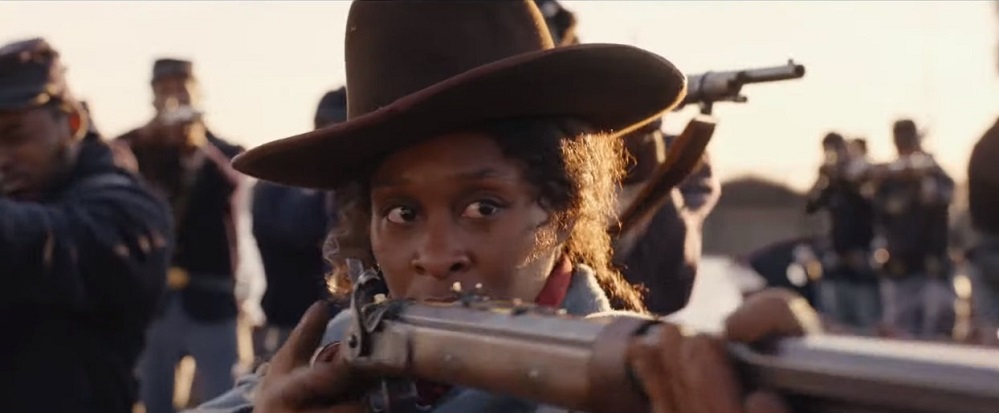American hero is the minimum description one can use to praise Harriet Tubman. Her story of escaping slavery — traveling alone for nearly 100 miles in harsh conditions to freedom — would be legendary enough. Returning to the south and freeing more than 70 slaves, including her entire family, without losing a single life is extraordinary. Add to all that Abolitionist figurehead, spiritual leader, and military strategist and Tubman did more in life than most could in one thousand.1 And if anyone was deserving of a cinematic tribute, it was certainly her.
Enter Kasi Lemmons’s Harriet which, obviously, centers on Tubman and her meritorious accomplishments, beginning with her escape from slavery and ending with her triumph at Combahee Ferry, where she commanded Union ships and transported more than 750 enslaved people to safety. Still suffering from a brain injury she received as a child, she has “visions” from God that guide and protect her, causing her to be not only be moral, but also a spiritual inspiration to those around her — leading to her being nicknamed Moses for leading “her people” to the “promised land.” The film follows her as she navigates the world of freedom and the abolitionist movement before the Civil War and her struggles to remain free from the throes of slavery.

The film’s biggest issue is its pacing and structure. Harriet sits in a weird place where it felt both too long and too short. Lemmons is a very good filmmaker, and neither she nor co-writer Gregory Allen Howard are strangers to making biopics about black icons, which is why it’s so odd that Harriet skates over Tubman’s incredible achievements in order to make its narrative so cliched. The Combahee Ferry raid takes place over maybe two minutes in the actual film. In fact, practically all of Tubman’s rescues via the Underground Railroad are handled via montage, with Lemmons and Howard devoting more time to garrulous political machinations of the abolitionist movement, but primarily concentrating on Tubman’s personal and family drama. Similarly, Joe Alwyn’s Gideon Brodess feels an unnecessary character to focus on, as Tubman’s story is extraordinary enough to not need a forced antagonist. It causes Tubman’s life to feel somehow underexplored even while running slightly over two hours.
As is the typical refrain for biopics, the film is a solid showcase for strong performances, particularly Erivo and Janelle Monáe. Erivo makes the film work, essentially driving Tubman’s arc solely through her performance. As Tubman grows from a scared slave to a powerful leader of men and women, Erivo’s acting becomes more forceful. It feels like a natural growth over the course of the film, despite some of the film’s more clunky time jumps. Monáe doesn’t get nearly the same amount of screentime, but it’s practically impossible not to be drawn to her. Much like Moonlight and Hidden Figures, she’s a magnetic presence onscreen, and her work here as a born-free black woman struggling with her own privilege is one of the film’s more interesting angles.

Speaking of, the film presents a myriad of angles that are disappointingly underdeveloped. Harriet could, rightfully, have been a black-and-white morality play, but there is nuance to what Lemmons is doing that sadly gets pushed to the backburner for the more traditional narrative. Tubman’s devotion to freeing slaves is challenged not only by the white slave owners, but by free blacks and abolitionists alike. She’s hunted by black bounty hunters looking to earn a reward for catching the legendary Moses. Her own family questions her judgement, and her closest ally, William Still, is often more focused on the politics of the Underground Railroad than in the actual freeing of slaves. At one point, Tubman even calls out Frederick Douglass for using his celebrity to divorce himself from the current plight of slaves. Obviously, and as evidenced by the mostly fictional slaver, Gideon, being the film’s purely evil antagonist, most of these transgressions pale in comparison to the atrocity that was slavery, but Lemmons is interested in interrogating more than just the simple good-vs-evil.
It’s a shame Harriet’s central narrative winds up being so banal, because there is a lot to admire about it. It’s so close to being a legitimately great film that it feels like so much more of a letdown that it’s merely “okay.” You can feel Lemmons trying to make Harriet something more, but the film is weighed down by the biopic genre’s homogeny. Tubman was not a woman who’s life fit into a Hero’s Journey or a formula, and the film comes to life when it eschews that structure. There just needed to be more of that.





